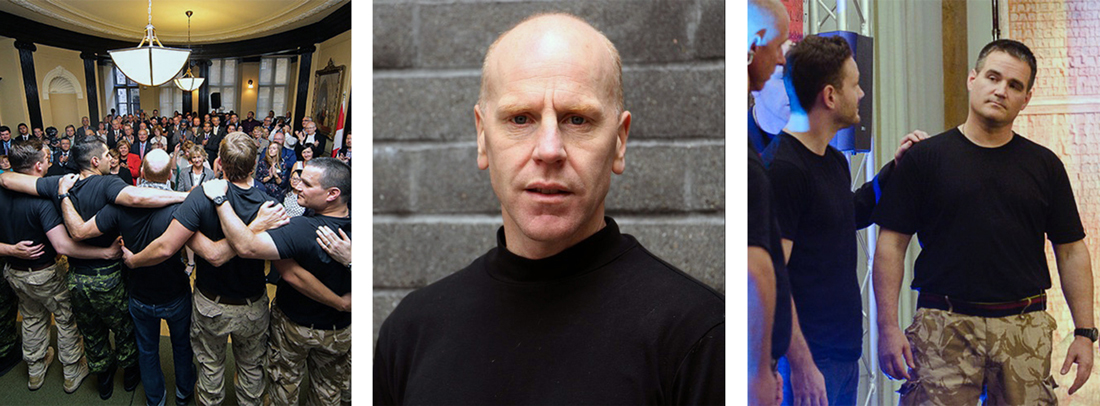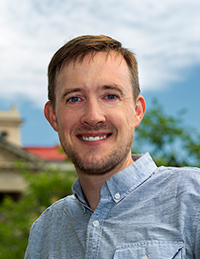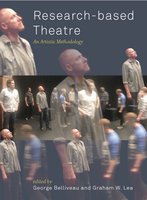
Belliveau (centre) to discuss the methodology behind research-based theatre production, Contact!Unload (left, right) at the Faculty of Education, 11 a.m. on Nov. 23.
Research-based theatre’s healing power
Staging their story helps military veterans deal with trauma
Peeking through a backstage curtain, Assistant Professor Graham Lea gauges the audience’s response to the performance.

Assistant Prof. Graham Lea
While onstage, veterans re-enact traumatic experiences from the line of duty, Lea’s gaze turns to the crowded sea of faces, where a couple stare, fixed in rapt attention—the man’s chest rising and falling, body tensing, then settling back into the seat when his partner lays a comforting hand on his leg.
The visceral spell of relived trauma finally breaks at the end of the play when one of the soldier-actors delivers the irreverent line: “I’m starting to see the strength it takes to unf**k your sh**.”
The couple exchanges expressions of grinning recognition. “…and you could see that yes, it does take a lot of strength, and that’s okay. That particular moment had quite a resonance with me,” Lea says, recalling that the couple later introduced themselves as veterans, both dealing with residual trauma.
“It became very gratifying for me, seeing the recognition that their struggles were okay. It was very powerful for me,” Lea says.
As principal writer, Lea scripted the experiences of military veterans who shared their stories with him, and then performed them onstage as a part of Contact!Unload, a research-based theatre project where the play becomes a catalyst for veterans who publicly interpret their struggles and experiences of transitioning to civilian life from military service in order to build resilience.
Since its initial run in Vancouver in spring 2015, the project has toured across Canada from Vancouver to the Invictus Games in Toronto, from policymakers on Parliament Hill, to a command performance for Prince Harry in London, England.
“It became very gratifying for me, seeing the recognition that their struggles were okay. It was very powerful for me.”
On Nov. 23, project leader, George Belliveau, currently professor in the Department of Language and Literacy Education at UBC, travels to Winnipeg to be inducted into the Royal Society of Canada for his work in research-based theatre, and its impacts on the emotional well-being of teachers, cancer patients, soldiers and their families. At 11 a.m., he will deliver a lecture about the Contact!Unload project in RM 200 in the Faculty of Education building. In addition to talking about the project, Belliveau will discuss the methodology of research-based theatre, a subject he has been researching with Lea, culminating in a book they co-edited in fall 2016.
It’s not the first time they’ve worked together. Belliveau was Lea’s English and arts method instructor for a BEd at UPEI, and then his master’s and PhD supervisor.
“So, I have known him for a long time,” Lea says, “His guidance and support have helped me to grow into the academic, artist, pedagogue, and person I am today.”
Lea says Contact!Unload, itself a research project, now moves into the “academic dissection phase” where about a dozen researchers will continue to publish papers and likely more than one more book. Notably some of the veterans have been recruited to work on some of the papers, as a way of mentoring them into academic writing and publishing.
“Arguably theatre’s good therapy for veterans. Is research good therapy?” Lea says.
What: Research-Based Theatre With Military Veterans
When: Thursday, November 23, 2017
Time: 11:00 a.m.
Where: Room 200, Education Building, Fort Garry Campus, U of M
For more information, contact:
Charlie McDougall, communications coordinator, Faculty of Education, 204 474 7402, or email: Charlie [dot] McDougall [at] umanitoba [dot] ca







